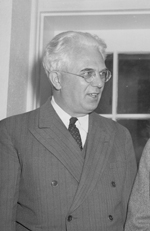Homer S. Ferguson
| Homer S. Ferguson | |
|---|---|
 |
|
| United States Ambassador to the Philippines | |
|
In office April 12, 1955 – March 23, 1956 |
|
| President | Dwight Eisenhower |
| Preceded by | Raymond A. Spruance |
| Succeeded by | Albert F. Nufer |
| Senate Republican Policy Committee Chairman | |
|
In office August 4, 1953 – January 3, 1955 |
|
| Preceded by | William F. Knowland |
| Succeeded by | Styles Bridges |
|
United States Senator from Michigan |
|
|
In office January 3, 1943 – January 3, 1955 |
|
| Preceded by | Prentiss M. Brown |
| Succeeded by | Patrick V. McNamara |
| Personal details | |
| Born |
Homer Samuel Ferguson February 25, 1889 Harrison City, Pennsylvania |
| Died | December 17, 1982 (aged 93) Grosse Pointe, Michigan |
| Nationality | American |
| Political party | Republican |
| Alma mater |
University of Pittsburgh University of Michigan |
Homer Samuel Ferguson (February 25, 1889 – December 17, 1982) was a United States Senator from Michigan. He was born in the Pittsburgh suburb of Harrison City, Pennsylvania to parents Samuel Ferguson (Oct. 1857 in Pennsylvania – 1933) and Margaret Bush (Nov. 1857 in Pennsylvania – 1940).
Ferguson attended public schools and the University of Pittsburgh. He graduated from the University of Michigan at Ann Arbor in 1913, was admitted to the bar the same year and commenced practice in Detroit, Michigan. He was judge of the circuit court for Wayne County, Michigan from 1929–1942 and also professor of law at Detroit College of Law (now part of Michigan State University) from 1929 to 1939.
Ferguson was elected as a Republican to the United States Senate in 1942 and was reelected in 1948, serving from January 3, 1943, to January 3, 1955. Ferguson successfully was re-elected in 1948, a year dominated by the Democratic party's upset wins. He was an unsuccessful candidate for reelection in 1954, defeated by Democrat Patrick V. McNamara.
While in the Senate, he served as chairman of the Republican Policy Committee in the 83rd United States Congress.
In 1948, he served as chairman of the Investigations Subcommittee of the Committee on Expenditures in Executive Departments, which held hearings on such matters as export control violations, for which Soviet spy William Remington was called in to testify; the trial of Nazi war criminal Ilse Koch; and the Mississippi Democratic Party's sale of postal jobs, which Mississippians from rural areas attested to purchasing.
...
Wikipedia
